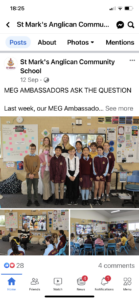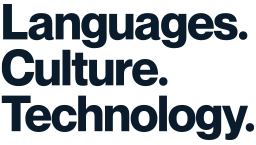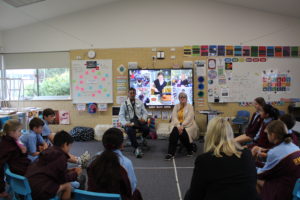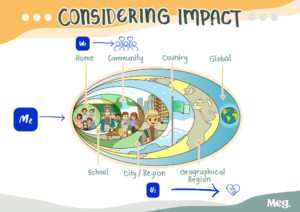Tackling Homelessness, Starting with Empathy: St Mark’s Anglican Community School Case Study
“We are very proud of our Global Citizenship Ambassadors who are already having a positive influence in the world.”
Steven Davies, Principal of St Mark’s Anglican Community School
St Mark’s Anglican Community School is an independent co-educational K-12 Anglican Christian school based in Hillarys, Western Australia. It describes itself as a centre of excellence in teaching and learning, pastoral care, worship and service, aiming to support students be their best selves and to contribute positively to the world.
The School’s Values are Respect, Knowledge, Confidence, Responsibility and Community, which married well with the Meg Going Global: Global Citizenship Student Ambassador Program and its aims. The School has integrated the UN Sustainable Development Goals into all learning areas of the curriculum since 2018 and are always looking for school initiatives that allow students to broaden their understanding in this area. The Student Ambassador program was chosen this year as an opportunity to put in to practise what they already knew and to work with experts, as well as other schools across the country. Tracey Toovey, the Student Ambassador Project Coordinator, worked with students across the year, supporting their weekly sessions and their outreach work.
Project outcomes:
The Student Ambassadors successfully implemented several outreach projects addressing the issue of homelessness including:
- Partnering with a number of community organisations to educate the community about the issue of homelessness and amplifying the impact of their projects.
- Collecting 34 bags of food in a Winter Food Appeal.
- Cooking and donating 157 individual meals.
- Collecting and donating 62 bags of hygiene items.
- Collecting and donating many bags of winter clothing, ‘filling the car’ with the donations.
“I was very passionate about working on this project as I had seen homeless people behind our local library and I wanted to do something to help them. I loved working with my friends and Mrs Toovey over the year and feel very proud of my efforts to speak at assemblies to get our message across. We had so much support and accomplished so much.”
Dylan Andes, Year 5 Global Citizenship Ambassador
Project description
The Student Ambassadors started their project by discussing which issues they saw around their school and community. They identified several issues, but after one of the students mentioned they’d recently seen an increase in homelessness in their local community, the Ambassadors decided this was the issue they wanted to focus on.
To address this problem they realised they needed to build understanding across the school as to why homelessness was an issue in their community and, at the same time, work with a range of community partners to ensure they were addressing the issue in a meaningful way and provide the support and items that were of actual need. They realised they needed to understand the issue of homelessness and the real needs that homeless people faced by hearing first hand from the organisations and people working directly with the issue. They reached out to The Grace Cafe, part of the Grace Anglican Church in Joondalup, who work with homeless people and people in need, and the staff agreed to come and talk with the students, sharing their experience of what people in these situations needed. The staff also brought a guest speaker who shared their experience and story about homelessness with the students. This allowed the students to connect to the issue of homelessness in an authentic way with real empathy and understanding.

Project 1: Winter Food Appeal
The Student Ambassadors identified that they wanted to tackle the issue of hunger that many homeless people face. Through the Grace Cafe staff and guest’s visit, the Ambassadors gained an authentic insight into the reality of hunger on the streets and quickly identified that a winter food appeal would be a great activity to start off with. They set up a whole school collection point for food items needed, collecting over 34 bags of foodstuffs to be donated for distribution.
Additionally, they reached out to a number of community organisations for donations of food items, with one of the Student Ambassadors visiting Coles, presenting their manager a letter requesting food donations. Coles management responded positively with a gift card the Ambassadors then used to purchase items requested by the Grace Cafe.

Project 2: Meals for those in need
One of the obvious needs the students quickly identified was that of nourishing food, with homeless people lacking both the funds to purchase it and also the absence of a home or kitchen to cook in. The students aimed to cook twenty plus meals each, with the assistance of their family and friends support network. They used ‘real life skills’ to do the necessary shopping and cooking of these items, learning with and from their family members about meal prepping and cooking. They then packaged up the items for distribution.
Project 3: Hygiene bags and clothing donations for those in need
Through discussions with The Grace Cafe in Joondalup, the Ambassadors identified that items often needed by homeless people, but rarely provided, were hygiene items. They learnt that, with limited funds each week, homeless people often have to forgo items that are not necessarily or seen as essential, such as hygiene items, instead prioritising food and clothing. The Ambassadors set up collection points for different types of hygiene items such as soap, shampoo and feminine hygiene items. They then differentiated these by male and female needs to help students think about selecting suitable items. 62 individual bags of multiple items were created and donated.
Clothing was another need that was made apparent to the Ambassadors and they set up a Winter Clothing Donation Collection Centre at school. So many items were donated that they managed to fill a whole car by the time it was delivered.


Project 4: Winter Christmas Appeal

Working in partnership with The Salvation Army, Heathridge, the students coordinated items that were requested and of most need by the Salvation Army for distribution to those in need over the Christmas and holiday period. The students decided to divide up the items per year group so that all the items needed were collected and they used their communication skills to communicate the items requested via announcements in the school newsletter and at assembly. They also used and developed strong organisation skills to physically set up collection processes for classes and year groups and then delivery to The Salvation Army.
“A fantastic innovative initiative. DEJI has been a cornerstone of international school curricula for many years and it is wonderful that St Marks Anglican Community School is thinking globally in it’s service learning. Change is the reality. Young people are the priority. Collaboration is the strategy.”
Jamie Lee, Inclusive Global Arts Education Designer
United Nations Sustainable Goals
As part of the knowledge exploration on topics linked to Global Citizenship Education, the students explored the UN Sustainable Development Goals and identified the following goals linking to their own project:
- 1: No poverty
- 2: Zero Hunger
- 3: Good Health and Wellbeing
- 17. Partnerships for the Goals
Implementation phase
The Ambassadors were aware that to be successful in their aims, they needed a range of skills, including strong project management skills, organisations skills, communication and collaboration skills, among others. They invited their local member of parliament, Ms Caitlin Collins, to come speak with them on the issue of Inclusive Leadership and responding to community needs. Ms Collins attended the school and spoke with the Ambassadors about these topics, encouraging them to be leaders where they saw need.
“What a fantastic learning opportunity for the Year 5s!”

Informing and educating others
Given the breadth of projects the students undertook across the year, they were kept busy each week and needed to use strong project management, organisation and communication skills. Each

of their projects used outreach to others in some way; to family, friends, school peers, community organisations, each requiring clear and effective communication of ‘the asks’ and
following up with well designed systems for collection of items, feedback, etc.
Some of the strategies they used to communicate about the project and communicate their ‘call to actions’ were:
- The school newsletter
- Displays around the school
- Announcements at school assembly
- School social media channels
Involving others
The Ambassador’s worked hard on several community partnerships, both educating the wider community and amplifying the effect of their projects, due to their strategic partnering.
The whole school, staff and students, were invited to take part in the different collections and drives that the Ambassadors ran, with information and education provided through a number of channels including school assemblies. Families and caregivers were also invited to take part through similar platforms and many family members were quite active in the meal preparation (shopping, cooking) part of the project.
The Ambassadors connected to community organisations strategically, asking for information to educate themselves about the real needs of homeless people in their community, but also to strengthen and broaden their impact, ensuring help got to those in need through community organisations, channels and networks. This showed the ‘Ripple Effect’ in action, not as a passive, accidental occurrence, but as a strategically intentional process the students utilised to ensure the appropriate help got to those in need.
The Ambassadors successfully partnered with different organisations for the different projects including The Grace Anglican Church, The Salvation Army: Hillarys, The Grace Cafe and Coles.
Project outcomes
Throughout the project the Student Ambassadors learnt a lot about the challenges facing others in their community and that many others do not live as they do, without the same access to resources. This was a big shift in thinking about societal inequalities, not only in the wider world, but on ‘their doorstep’ in their local community.
The support of the school and the whole school community was overwhelming. The Student Ambassadors rallied to make people aware of the issues of homelessness and the community stepped up to make this reality. Classroom teachers helped facilitate the collection of items and reinforced the need for them, through further education at a classroom level. Staff were also educated about the issue through the Student Ambassadors information sessions at assemblies. This aligned with the school’s strategic plan and their aim of developing globally competent learners.
Each of their projects, was successful in the number of items collected and provided to homeless people, but also through raising awareness in their school
community of the realities of homelessness. The students had identified real items needed, meeting these needs by working with a range of different groups of people, which ensured the impact made met real needs.
Educators and the community members involved, also benefitted by being exposed to the ideas of Students as Changemakers and the impact and success they can have as active and engaged Global Citizens. They observed a real example of Student Voice and Agency in action, with clear success for not only the Student Ambassadors, but for all impacted by the project’s successes.
Through the implementation phrase, the project stayed similar to the original project plan and aims the Student Ambassadors had designed, but due to focussed time spent each week together as a group, they were able to achieve much more than they had anticipated. The group of students were actively involved and wanted to do more. They described being overwhelmed with the amount of community support they received both from the school community and outside.
“I really feel my leadership skills improved by being part of this project. I was nervous about speaking at assemblies but now I feel much more confident. I enjoyed being part of the online sessions and learning about what being a Global Citizen and world changer is all about. I liked it that we got to meet up with others students from other schools.”
Zac Willsher ,Year 5 Global Citizenship Ambassador
Students involved in the project needed to use a wide range of skills for both the project design and the implementation phases. Their accompanying educator, Tracey Toovey, observed and identified their use and growth in the following skills:
- Confidence: Huge shift in confidence over the project of what they thought they could achieve to what they achieved.
- Leadership: Quiet students came out of their shells and led with confidence.
- Communication/Speaking skills: Through exposure to experiences that allowed them to use these skills, a huge improvement was made.
- Ambitious individuals: The program allowed these students to be knowledgeable so they had the confidence and drive to reach their goals.
“The Year 5 Global Citizenship Ambassadors and myself were honoured to be part of this program. The wealth of knowledge Lottie (course facilitator) and her team of experts brought to the sessions allowed us to increase our expertise in this domain.
We loved that each time we met we got to interact with other schools and experts in the field to share our thoughts and experiences. All the projects came from different domains and our students enjoyed learning just what other schools were doing.
The growing recognition of the importance of the principles of diversity, equity, justice and inclusion (DEJI) to the success of peacebuilding efforts around the world was topical to us. It required tackling head on the challenges peacebuilders face and addressing important questions. We found this a really valuable part of the program as it was something we had not addressed before and gave us ideas of where we needed to head.
The program gave my students the opportunity to recognize that not all people live like they do and have the resources they have, the power of student voice in invoking changes and the need for empathy and gratefulness.”
Tracey Toovey, Student Ambassador Project Coordinator.
Project alignment to school and state curriculum
St Mark’s prides itself on its Learning Service program that runs from K-12, aiming to develop lifelong learners, striving for excellence and equity in all they are.
Alignment to the Western Australian State curriculum:
The project particularly aligned with outcomes outlined in the subject area: Humanities and Social Sciences – Civics and Citizenship.
From the seven General Capabilities, it aligned with four in particular:
- Information and Communication Technology (ICT) capability
- Critical and Creative Thinking
- Personal and Social capability
- Ethical understanding
2023 involvement and beyond
The Student Ambassador program is planned to continue as an optional club in 2023 with students still to decide if they will build on the current issue of addressing homelessness or address an entirely new issue altogether. Implementing the learnings from this year will ensure a strong foundation of knowledge around project design and community partnerships will continue, alongside the schools Service Learning lens.







